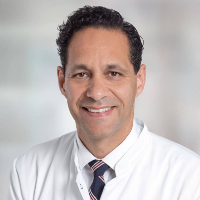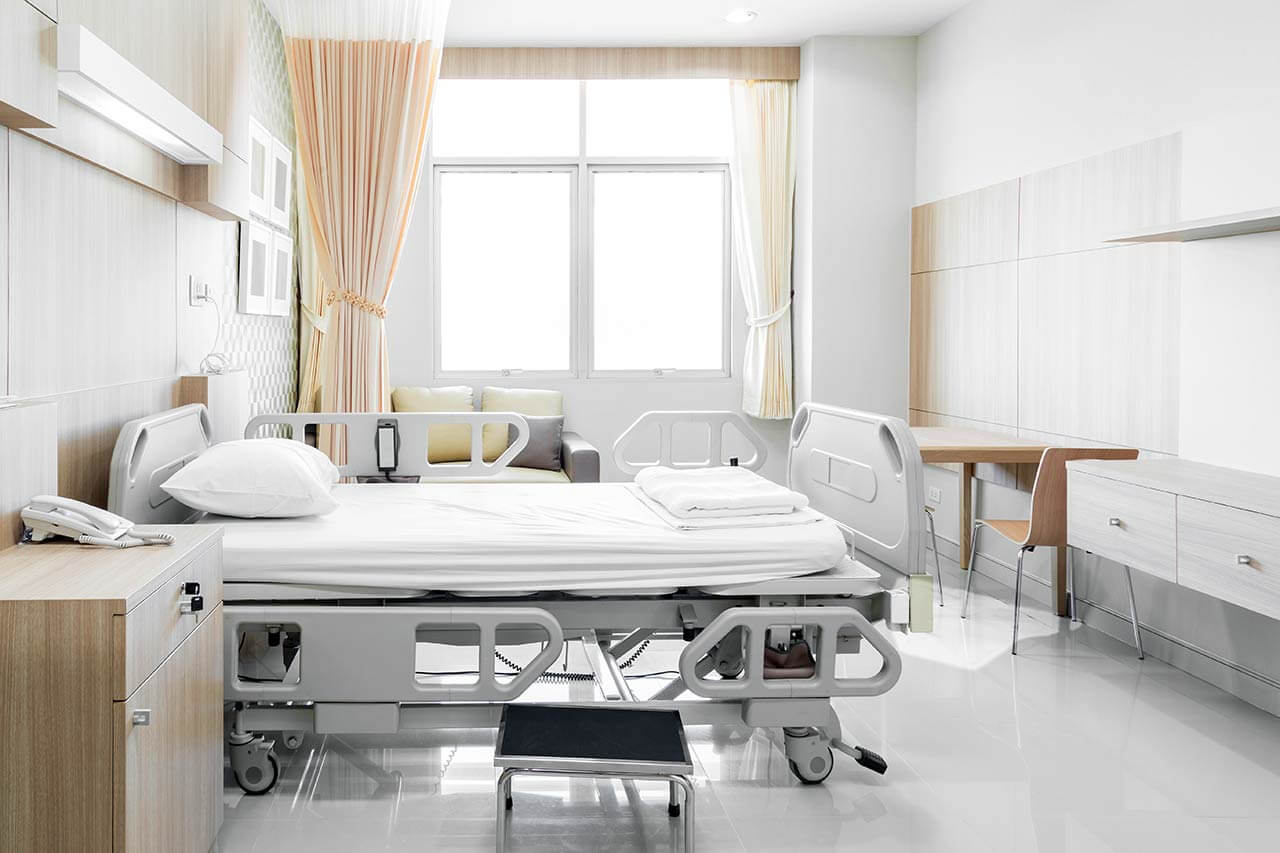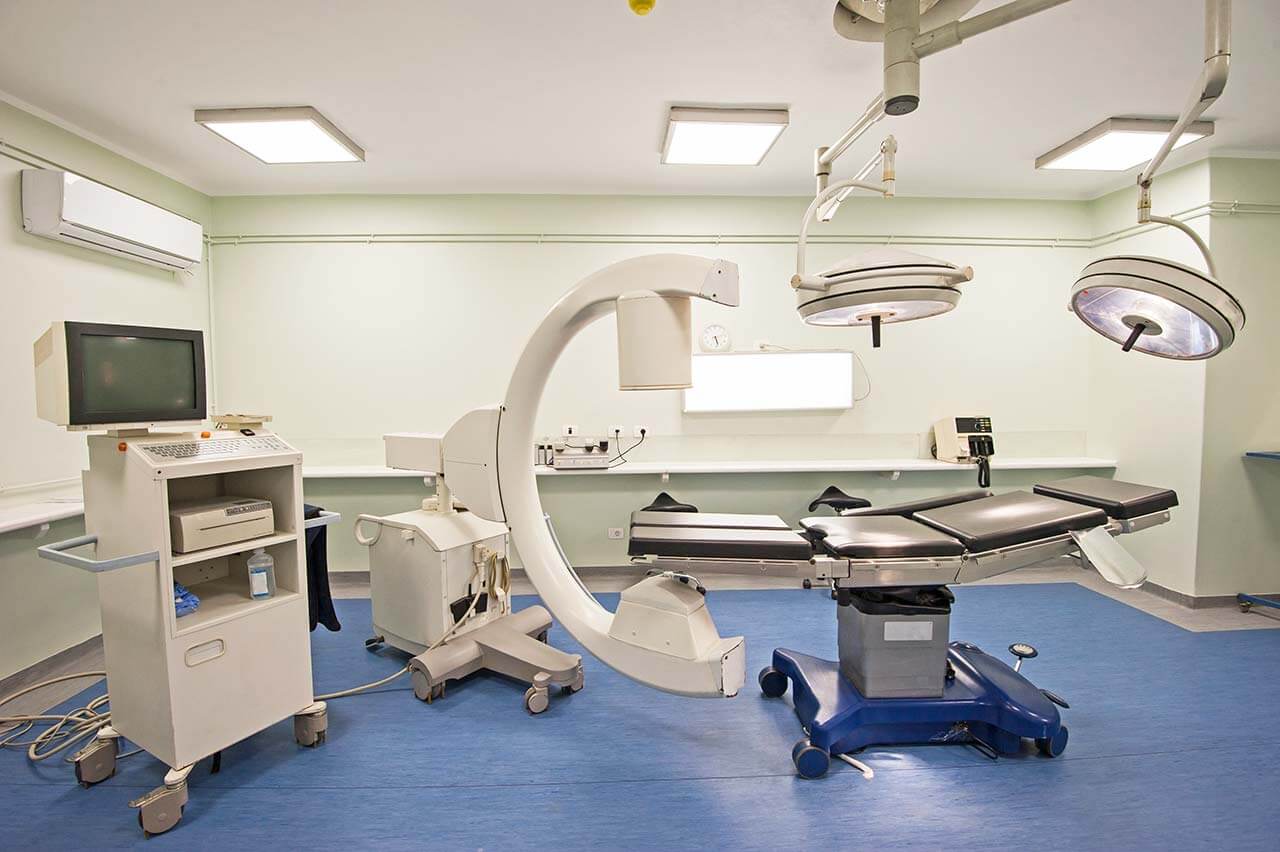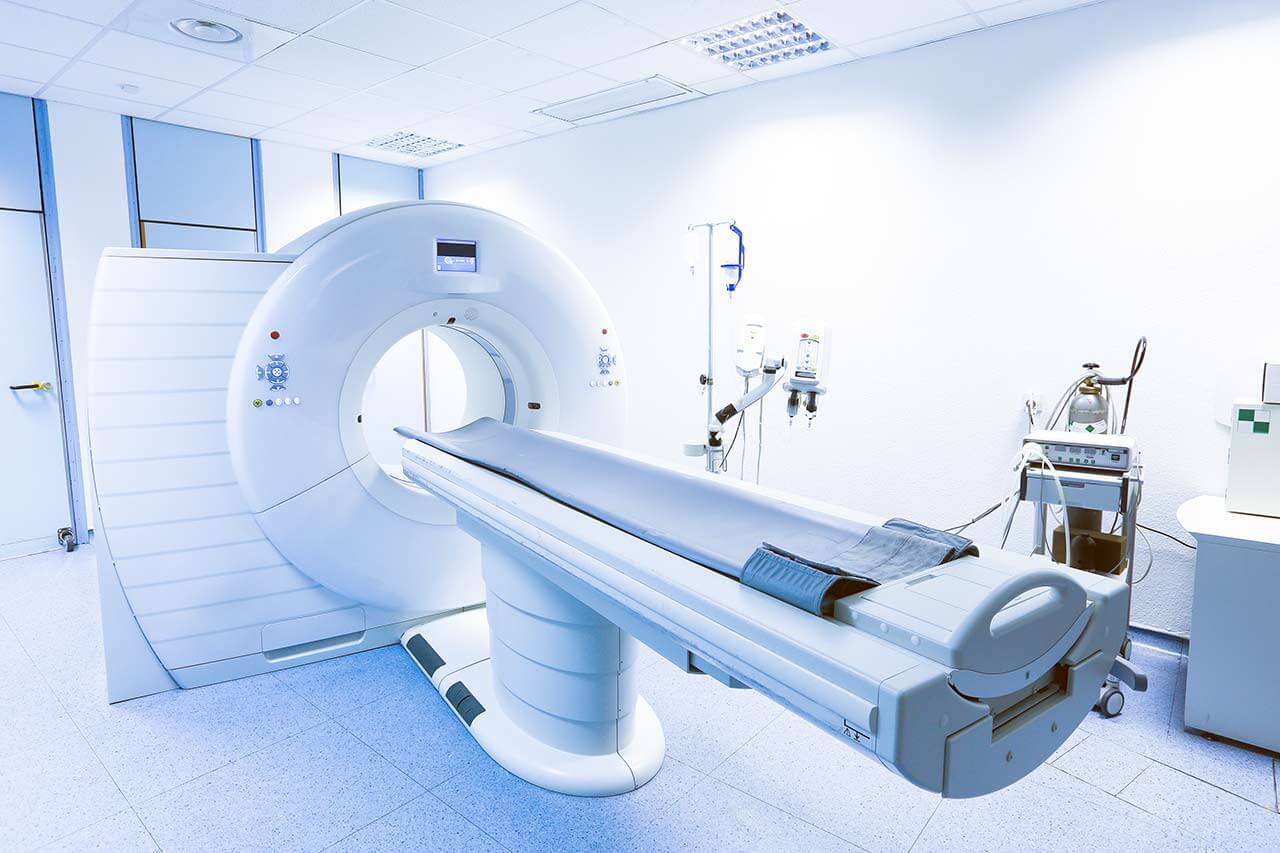
The program includes:
- Initial presentation in the clinic
- clinical history taking
- review of medical records
- physical examination
- laboratory tests:
- complete blood count
- general urine analysis
- biochemical analysis of blood
- TSH-basal, fT3, fT4
- tumor markers
- inflammation indicators (CRP, ESR)
- indicators of blood coagulation
- abdominal ultrasound scan
- CT scan/MRI or PET-CT of abdomen
- preoperative care
- cytoreductive surgery to remove visible tumors
inside the abdomen and HIPEC - histological and immunohistochemical
examination of removed tissues - symptomatic treatment
- cost of essential medicines
- nursing services
- stay in the hospital with a full board
- accommodation in a 2-bedroom ward
- elaboration of further recommendations
How program is carried out
During the first visit, the physician will conduct a clinical examination and go through the results of the available diagnostic tests. After that, you will undergo the necessary additional examination, such as the assessment of liver and kidney function, ultrasound scan and tomography of the abdominal organs. Based on the results of the examination, the physician will choose the surgical technique and the type of anesthesia. After that, preparation according to the preoperative standard will start.
Cytoreductive surgery begins with general anesthesia. The intervention is performed as open surgery, i.e. through the incision in the anterior abdominal wall, so that the surgeon can carefully examine the peritoneum and the surface of the abdominal organs. The surgeon removes affected by the malignant process areas of the duodenum and peritoneum, metastases in other internal organs. This stage of the operation can take several hours, since the overall effectiveness of the treatment depends on the completeness of the malignant tissues removal.
At the next stage of the operation, the surgeon inserts several catheters into the abdominal cavity. Through the catheters, a heated solution of a chemotherapy drug is pumped inside. The special system maintains the required temperature (42-43 degrees Celsius), pressure and circulation rate of the medicinal solution. The solution mechanically flushes out blood clots and remnants of malignant tissues, and a heated chemotherapy drug destroys micrometastases in internal organs and lymph nodes (micrometastases can’t be detected by the naked eye).
After 1-1.5 hours, the chemotherapy drug is removed from the abdominal cavity and the abdominal cavity is washed with saline. After that, the surgeon removes the catheters and sutures the incision of the anterior abdominal wall.
After the completion of the operation, you will be transferred to the ward of the intensive care unit, under the round-the-clock supervision of doctors and nurses. In 1-3 days after the operation, your drains will be removed and you will be transferred to a regular ward for further recovery. The whole treatment takes 10-12 days on average.
Finally, the attending physician will evaluate the results of control examinations, schedule the date of discharge from the hospital and give you detailed recommendations for further follow-up and treatment.
Required documents
- Medical records
- Esophagogastroduodenoscopy (EGD), MRI/CT scan (not older than 3 months)
- Biopsy results (if available)
Service
You may also book:
 BookingHealth Price from:
BookingHealth Price from:
About the department
The Department of General, Abdominal Surgery and Surgical Oncology at the Helios Hospital Berlin-Buch offers the full range of services in these medical fields. Whenever possible, operations are performed using minimally invasive techniques, which are the gold standard of modern surgery. The outstanding quality of medical care is confirmed by numerous prestigious certificates, including certificates from the German Cancer Society, the German Hernia Society, etc. In addition, the department provides innovative hyperthermic intraperitoneal chemotherapy (HIPEC), which is available only in the most progressive clinics in Europe. The Head Physician of the department is Prof. Dr. med. Roger Wahba.
One of the key focuses of the department is the treatment of peritoneal tumors, abdominal metastasis and sarcomas. The basis of clinical practice is the use of the most sparing and at the same time the most effective therapeutic methods. The doctors of the department work closely with specialists in the field of chemotherapy and radiation therapy. Thus, each patient receives treatment according to the optimal, individually developed plan. Special treatment methods in this area include intraoperative electron radiation therapy (targeted destruction of cancer cells, which provides optimal protection for healthy tissue and neighboring organs), hyperthermic intraperitoneal chemotherapy (chemotherapy, during which the abdominal cavity is washed with a warm chemotherapeutic solution that kills the remaining tumor cells after surgery) and pressurized intraperitoneal aerosol chemotherapy (a special chemotherapeutic solution is injected into the abdominal cavity, after which it penetrates into all areas affected by the tumor). These treatment methods are used only in highly specialized leading clinics in the world.
Hepatobiliary surgery also occupies an important place in the work of the department. The doctors of this field treat liver, gallbladder and bile duct tumors. Before the appointment of a particular operation, the patient will undergo a CT scan, which allows to get a three-dimensional image of the organ and plan the intervention as accurately as possible. The therapeutic options in this area include tumor resection, radiofrequency ablation, transarterial chemoembolization, selective internal radionuclide therapy, stereotactic radiotherapy and many other treatment methods.
The department's range of medical services includes:
- Surgical treatment of abdominal tumors, metastasis and sarcomas
- Intraoperative electron radiation therapy
- Pressurized intraperitoneal aerosol chemotherapy
- Hyperthermic intraperitoneal chemotherapy (HIPEC)
- Surgical treatment of diseases of the thyroid gland, adrenal gland and pancreas
- Chronic pancreatitis
- Pancreatic tumors
- Adrenal tumors
- Thyroid tumors, including medullary cancer
- Nodular goiter
- Hyperthyroidism
- Goiter, including relapsing forms
- Malignant diseases of the parathyroid glands
- Hyperfunction of the parathyroid glands (hyperparathyroidism)
- Multiple endocrine neoplasia in men
- Minimally invasive video-assisted surgery (MIVA)
- Surgery using bilateral axillary-breast access
- Hepatobiliary surgery
- Surgical resection
- Radiofrequency ablation
- Transarterial chemoembolization
- Selective internal radionuclide therapy
- Stereotactic radiation therapy
- Intraoperative radiation therapy
- Perioperative chemotherapy
- Surgery for inguinal hernias and anterior abdominal wall hernias
- Classic open surgery
- Minimally invasive surgery
- Surgical treatment of bowel disease, fecal incontinence
- Inflammatory bowel disease
- Crohn's disease
- Ulcerative colitis
- Rectal and anal diseases
- Anal fissures
- Anal fistula
- Anal carcinoma, colon and rectal cancer (treatment within a certified center)
- Perianal venous thrombosis
- Diverticulitis
- Hemorrhoids
- Condylomas/genital warts (surgical removal or laser therapy)
- Rectal prolapse (minimally invasive anal surgical procedure with direct access or access through the abdominal cavity)
- Pilonidal sinus
- Impaired bowel movements
- Rectocele
- Pelvic floor muscle disorders and fecal incontinence
- Sling procedures
- Neuromodulation (stimulation) of the nerve roots of the sacral spinal cord
- Artificial urethral sphincter implantation
- Surgery for rectal prolapse and fistula
- Muscle relaxant injections for irritated bladder and pelvic floor muscle tension
- Bladder enlargement
- Artificial urine diversion
- Malignant tumors of the small, large intestines and rectum
- Inflammatory bowel disease
- Surgical treatment of inflammatory processes of the cecum and gallbladder (mainly minimally invasive surgery)
- Gallstones
- Appendicitis
- Endoscopic and minimally invasive surgery
- Other treatments
Curriculum vitae
Since August 2023, Prof. Dr. med. Roger Wahba has been heading the Department of General, Abdominal Surgery and Surgical Oncology at the Helios Hospital Berlin-Buch. Prior to this, the specialist held the post of Senior Physician in the Department of General and Abdominal Surgery, Surgical Oncology and Transplant Surgery at the University Hospital Cologne (since 2011), where in 2015 he introduced a special program for the treatment of peritoneal cancer into clinical practice. Since 2018, he has also served as Director of the Liver Cancer Center.
Prof. Roger Wahba graduated from the Faculty of Medicine at the University of Cologne. In 2011, the specialist was board certified in surgery. In 2014, he also successfully completed board certification in abdominal surgery and advanced training in transplant surgery. In 2016, the doctor received additional qualifications in special abdominal surgery. Prof. Wahba has exceptional experience in the field of surgical oncology, having been awarded the title of surgical oncology specialist by the European Union of Medical Specialists (UEMS).
Photo of the doctor: (c) Helios Klinikum Berlin-Buch
About hospital
According to the reputable Focus magazine, the Helios Hospital Berlin-Buch ranks among the top medical facilities in Germany!
The hospital is proud of its rich history, which dates back over 100 years, as well as the status of a maximum care medical center with exceptionally high success treatment rates. The medical institution is an academic hospital of the Charite Medical Complex, which is one of the best in Europe and around the world. To provide its services to patients, the hospital has over 1000 beds, over 60 specialized departments, centers and institutes, including emergency service and a helipad, as well as 23 state-of-the-art operating rooms.
The medical institution presents almost all branches of modern medicine, many of which are certified by professional German societies (for example, certification of the German Cancer Society, German Diabetes Society).
The hospital diagnoses and treats about 52,000 inpatients and more than 144,000 outpatients every year. The medical services and patient care are provided by world-renowned highly competent doctors and qualified nursing staff. To achieve the best treatment results, the doctors of related medical disciplines work closely together and jointly develop optimal treatment regimens.
It is worth noting that the hospital is located in a beautiful green park area. In the immediate vicinity of the hospital one can find Buch Castle, Buch Forest and Barnim Nature Park. All this has a beneficial effect on patients, as they have the opportunity to stroll through beautiful places that inspire and help to gain strength for the successful overcoming of the therapeutic process.
Photo: (c) depositphotos
Accommodation in hospital
Patients rooms
The patients of the Helios Hospital Berlin-Buch live in comfortable rooms made in bright colors. Each patient room is equipped with an ensuite bathroom with shower and toilet. The standard room includes an automatically adjustable bed with a system for calling nursing staff (this system also serves to use TV, radio, lamps), a bedside table, a locker for storing personal belongings, a TV, a radio. The hospital offers WI-FI.
Meals and Menus
The patients of the hospital are offered tasty and balanced three meals a day. Breakfast is served as a buffet with a wide selection of pastries, cereal, sausages and cheese. For lunch, the patients usually have a choice of three menus, including a vegetarian menu. Also, the patient can independently combine a lunch menu from various meat, fish and vegetarian dishes and side dishes. Dinner includes a standard menu and dishes that the patient can choose on his own to his taste.
In addition, the hospital houses a cozy cafe with an excellent assortment of pastries, fresh salads, sandwiches, as well as traditional Berlin dishes. Here you can enjoy a cup of aromatic coffee, hot tea or refreshment drinks.
Further details
Standard rooms include:





